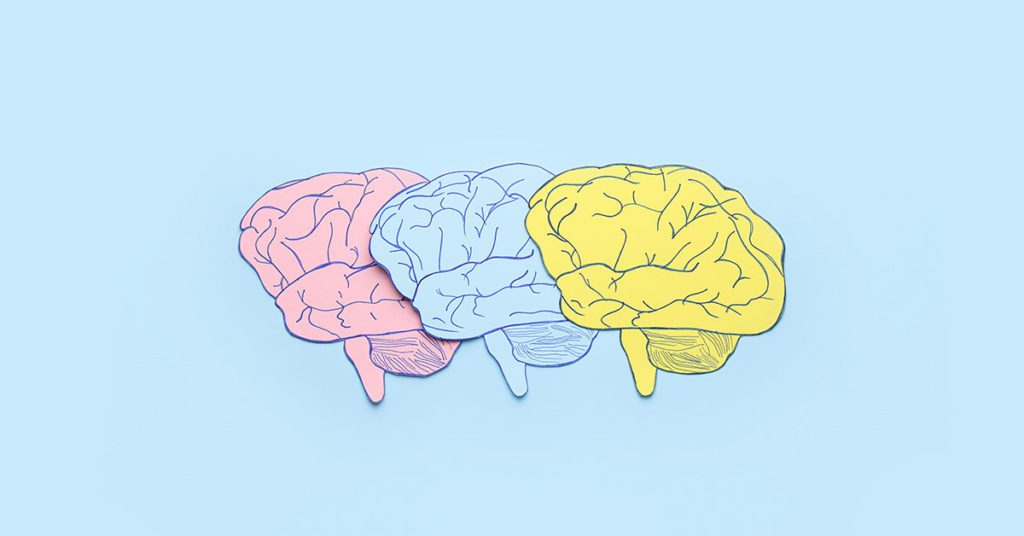


The Connection Between Memory and Stress
Although a little stress is normal from time to time, persistent, chronic stress can impact our brains and how we form memories. That makes stress management critical when it comes to protecting memory and long-term brain health. Keep reading to learn more about memory and stress as well as tips to process emotions in a brain-healthy way.
Stress and the Brain
Stress is the body’s reaction to a perceived threat. It’s a survival mechanism that helps us get out of danger quickly. The body goes into “act fast” mode, which causes a series of physiological and chemical reactions that affect every system in the body.
How does stress affect the brain and body?
- The part of the brain that handles survival instincts (the amygdala) becomes active.
- The sympathetic nervous system releases hormones, like adrenaline and cortisol, to alert the body.
- The heart beats faster, pumping more blood, so your body can respond faster.
- Breathing increases to send more oxygen to power your body.
- Blood flow to the surface decreases and reallocates to the brain and muscles, causing the skin to appear pale.
- Pupils dilate to increase awareness of danger.
- Muscles tense and prepare to react quickly.
How Does Stress Affect the Brain and Memory?
According to Dr. Kerry Ressler, Chief Scientific Officer at McLean Hospital and Professor of Psychiatry at Harvard Medical School, all kinds of stress affect the brain in some way. This is true for animals as well as humans.
The brain is by far the most complex system in the body. It doesn’t act as a single unit. It consists of many functions all working together at the same time. When one part of the brain becomes active, another part may not have as much power to do its job.
In a stressful situation, the brain has to use its resources wisely. Energy goes to the part of the brain that handles your survival instincts, called the amygdala. That leaves less energy for high-ordered tasks like storing memory. This explains why a lot of people have trouble remembering details correctly after a traumatic event.
Stress is an unavoidable, natural part of life. It’s a response system in the body that helped our ancestors get out of dangerous situations, like escaping a predator or surviving a natural disaster.
Today, most of us don’t have to worry about running from a wild lion, but we still have our own kinds of stress to deal with, and our bodies don’t know the difference. Of course, traumatic events can cause stress. Even non-life threatening situations, like unpaid bills, busy schedules, and work pressure, can trigger the stress response. If left unmanaged, stress could lead to physical issues and impact our ability to form memories.
In fact, persistent stress can actually rewire your brain. Evidence shows that animals who experience chronic stress have decreased activity in certain parts of the brain. More primitive parts of the brain focused on survival stay active, like the amygdala. Over time, the more active parts of the brain become stronger causing those regions that get less attention to weaken.
How to Protect Your Memory from Stress
Stress management techniques can help process emotions and protect the brain from stress over time. Balance stress and memory function with these practices to feel calm.
1. Meditation
It’s a technique that goes back thousands of years. And today, science supports the tremendous benefits of meditation on our health. Not only does it help reduce stress, but extended focus during meditation may also improve memory.
There are many forms of meditation practices. Mantra meditation, for example, involves the repetition of prayer or phrases to help focus the mind. During mindfulness meditation, you focus on awareness of the present moment. If you have trouble sitting still, try active meditation practices such as yoga, tai chi, qigong, or mindful walking.
Learn more tips on how to reduce stress and feel your best.
2. Remember to rest
Stressful situations may cause you to panic and continue to “go-go-go” when really you need to slow down and rest. A fast-paced life can make it even more difficult to process stress in a healthy way. Our brains kick into overdrive, which can cause cognitive problems over time. Make it a point to slow down sometimes, so your body can rest and recover from stress.
Tips to slow down:
- Unplug and spend less time on your phone.
- Go for a walk outside to “clear your mind” and take a break.
- Listen to relaxing music.
- Prioritize your to-do list and free up time in your schedule.
- Take breaks and practice breathing exercises or meditation.
3. Exercise
You’ve heard the phrase, “shake it off.” Well, there’s some wisdom behind that saying!
In his book, Why Zebras Don’t Get Ulcers, neurobiologist Robert Sapolsky discusses nature’s way of relieving stress. Animals literally shake after experiencing the stress-response.
Shaking helps loosen up the muscles, burns off extra adrenaline, and calms the nervous system. So, the next time you feel stressed, move around! Dance, go for a run, stretch—this type of movement will help restore your body to its natural state.
4. Calm your nerves with the physiological sigh
Dr. Andrew Huberman is a neuroscientist in the Department of Neurobiology at the Stanford University School of Medicine. To calm the nervous system immediately, he recommends the physiological sigh:
The physiological sigh is a pattern of breathing two inhales through the nose followed by an extended exhale through the mouth.
The physiological sigh produces a real-time calming effect by activating the parasympathetic nervous system, responsible for reducing stress. This quick fix can help restore your body to a relaxed state and ease the impact of stress on memory.
5. Support the brain with supplements
Certain herbs have the ability to calm the mind and alleviate the effect of stress on the brain. So include a few of these brain-healthy supplements in your wellness routine:
- Ashwagandha supports alert relaxation and stress relief. It has been used in traditional Indian medicine for thousands of years to help balance mood and protect long-term brain health.
- GABA is a neurotransmitter that calms messaging between brain cells, leaving you feeling more relaxed.
We all experience stress from time to time. Learning how to manage it can help cope with stress, so you feel calm and more resilient. Protect your memory from stress with NeuroQ Calm Focus gummies.
- Tags: Ashwagandha, GABA, Stress


